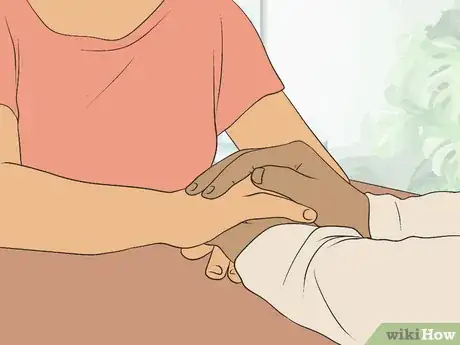This article was co-authored by Klare Heston, LCSW. Klare Heston is a Licensed Independent Clinical Social Worker based in Cleveland, Ohio. With experience in academic counseling and clinical supervision, Klare received her Master of Social Work from the Virginia Commonwealth University in 1983. She also holds a 2-Year Post-Graduate Certificate from the Gestalt Institute of Cleveland, as well as certification in Family Therapy, Supervision, Mediation, and Trauma Recovery and Treatment (EMDR).
This article has been viewed 53,311 times.
Learning to trust after a partner cheats on you can be extremely difficult. However, you shouldn’t let a past relationship rob you of a fulfilling relationship with a new partner. To open up and trust a new partner, you should trust yourself, let go of the past, learn to be open with people, and avoid being suspicious of your partner’s every move.
Steps
Moving On From the Past
-
1Remember that your new partner is not your old partner. Before you can truly trust someone new, you have to let go of and move on from your past relationship. Remind yourself that the person you are currently with is not your past partner, but a new person. This means they are not going to do the same thing to you that your past partner did. Work on separating the two people.[1]
- You may not be completely healed, but you can’t dwell on what happened to you in the past. Let go of it and move forward.
- Keep in mind that many people need professional help after a violation of trust in their relationship.
-
2Have confidence in your judgment. After your partner cheats on you, you may start to question yourself. You may not trust yourself to judge whether your current partner is someone who can be trusted or cares about you. Trust yourself and your judgment. Remember that it is not your fault that your previous partner was unfaithful. You probably would not have been able to prevent it, notice signs, or change anything. Let go of any guilt or blame you feel that will keep you from trusting again.[2]
- Trust your instincts. Going through what you have can give you new insights, but remember to trust your intuition and gut feelings.
Advertisement -
3Make the decision to trust. Sometimes, you have to decide to trust someone. You may be scared of getting hurt, but your past shouldn’t keep your from future fulfilling relationships.[3]
- This means you believe the person is a good person worthy of your trust. You believe they don’t mean to hurt you intentionally. However, it also means you know they will make mistakes and you both will probably unintentionally hurt one another. This is inevitable in all relationships.
-
4Seek professional help. Sometimes, it can be hard to move on. Getting over being hurt and having someone you trust break that trust can be difficult to deal with. If you can’t move on from your past relationship, get help from a therapist or counselor. A counselor can help your work through the pain and move forward with your life.
- A therapist can talk with you about your experience and help you face your pain and any issues that have arisen because of it.
- You might have had trust issues within your family have carried over into your relationships.
Learning How to Trust Again
-
1Recognize that everyone makes mistakes. Your new partner won’t be perfect. No one is. This means they make mistakes. If your partner makes a mistake, remind yourself that it wasn't intentional. Don’t automatically assume the mistake was made to hurt you.[4]
- Know what things are mistakes that will end a relationship. Because you have been cheated on before, any cheating behavior will probably be a dealbreaker. Lying may also be something that can lead to a breakup. However, small things, like forgetting something or disagreeing, don’t mean your new partner can’t be trusted.
-
2Take responsibility for your actions. When you have trouble trusting someone, it can negatively impact your relationship. You may be standoffish, closed off, and put walls between you and the other person. This will eventually cause the relationship to stall and fall apart.[5]
- Admit when you are doing things to interfere with the relationship. This may be keeping your new partner at arm’s length or breaking commitments. By facing your behavior, you can work to change it and build more trust.
-
3Learn to be open and vulnerable. Part of what happens when trust is broken is that people build walls and become harder and more distant. This is often necessary, but when you find someone you care about, you should let yourself be vulnerable. Being open with your new partner can give you the opportunity to build a wonderful new relationship.[6]
- Being open and vulnerable doesn’t mean that you forget what you learned, stop watching for warning signs, or stop being smart about the relationship. It just means you give your new partner a chance to prove that they are trustworthy.
-
4Discuss your trust issues with your partner. When you and your new partner start getting close, you should open up and explain your situation. Letting them know that you have been cheated on and have some trust issues can help you both set boundaries and know what is expected from each other.[7]
- You can say, “My previous partner cheated on me, and it hurt me. I have trust issues, but I am working on it. I think we should talk about our ideas of trust and set boundaries with each other.”
-
5Question mistrustful thoughts. When you find yourself not trusting someone, stop and analyze those thoughts. Ask yourself why you are having these thoughts. Are they based on something the new person has done? Or are they a result of your own issues?[8]
- Taking the time to address your worries can help you keep in control of them and not let past experiences of broken trust interfere with new relationships.
Interacting With Your Partner
-
1Understand your partner's actions by asking questions. If you have doubts about your partner’s actions or words, ask more questions. There’s nothing wrong with talking to your new partner and getting enough information so that you feel confident in their trust. If you are confused about why they did or said something, ask. The goal is to understand their actions, and the thinking and reasoning behind them.[9]
- However, asking too many questions, nagging them, or not believing them when they tell you something can lead to problems.
-
2Refrain from demanding to know everything about your partner. Because of your previous cheating partner, you may feel the need to know everything about your partner. This may include where they go, who they are texting, or what they are doing on social media. However, this is not healthy and an invasion of your partner’s boundaries and privacy.[10]
- Don’t ask for passwords to social media or email accounts. Don’t read their texts or look at their call log without their permission.
- Avoid from checking up on them. This shows that you don’t trust them.
-
3Avoid thinking that the past will be your future. Just because one partner has cheated on you doesn’t meant that it will happen again. The past isn’t guaranteed to repeat itself. As you find a new partner, remind yourself that this person isn’t going to do the same thing as people in the past.[11]
- If you want to pursue a relationship with someone new, they deserve to be judged on their actions, not the past.
References
- ↑ http://www.huffingtonpost.com/2014/06/30/cheating-recovery_n_5545590.html
- ↑ http://www.loveisrespect.org/content/building-trust-after-cheating/
- ↑ http://www.mindbodygreen.com/0-7617/how-to-trust-especially-when-youve-been-hurt.html
- ↑ http://movingpastdivorce.com/2013/06/6-ways-to-mend-broken-trust-after-divorce/
- ↑ http://movingpastdivorce.com/2013/06/6-ways-to-mend-broken-trust-after-divorce/
- ↑ http://tinybuddha.com/blog/learning-to-trust-let-go-of-your-fear-and-let-your-guard-down/
- ↑ http://www.huffingtonpost.com/2014/06/30/cheating-recovery_n_5545590.html
- ↑ http://movingpastdivorce.com/2013/06/6-ways-to-mend-broken-trust-after-divorce/
- ↑ http://www.loveisrespect.org/content/building-trust-after-cheating/







































































